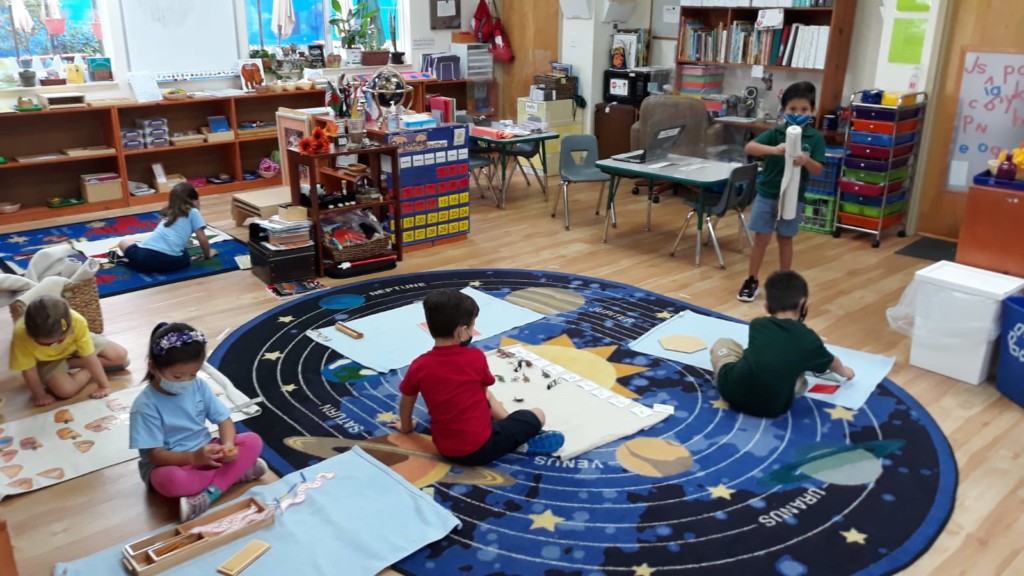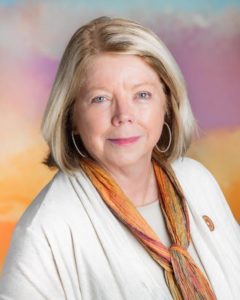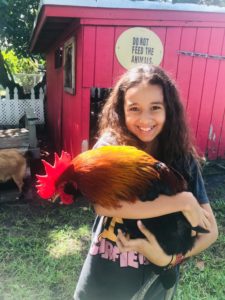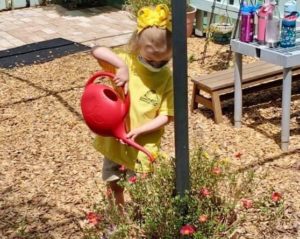
For more than four decades, Judy Dempsey has sought to bring out the best in children while offering education options to Florida families. For the past 26 years, she has owned and operated Summit-Questa Montessori School in Davie, which serves children from 18 months through eighth grade. About 20 percent participate in Florida Tax Credit, Family Empowerment and McKay Scholarship programs.

SQMS students thrive on a 10-acre campus featuring native habitats, numerous gardens, a wetland preserve, a mini-barnyard, outdoor fields, a gymnasium and two pools. The school also is the site of Summit Montessori Teacher Training Institute, an accredited educator training center affiliated with the American Montessori Society, for which Dempsey serves as co-director. Since 2003, she has been instrumental in training hundreds of teachers in the Montessori method, which is based on self-directed activity and hands-on learning.
Dempsey served for five years as 1st vice president and director of accreditation on the board of the Association of Independent Schools of Florida, a statewide organization that accredits private schools and recognizes prominent educators. She was named the 2016-17 Richard and Dorothy Lear Distinguished Educator of the Year, the association’s highest honor, in recognition of her efforts to provide a quality education to children in South Florida. In her book “Turning Education Inside Out: Confessions of a Montessori Principal,” she details her experience as a Montessori educator, administrator, school owner and teacher trainer.
redefinED reached out to Dempsey to learn more about what Montessori has in common with unschooling and micro-schools, her passion for education, and her interest in offering education choice opportunities to families. Answers have been edited for clarity and brevity.
Q. What during your early life inspired you to pursue a career in education?
A. I did not intend to go into education when I was younger. I had a very creative spirit running through me and wanted to become an artist. My parents, however, had a different goal in mind for me when I attended college. They wanted to make sure that I would have a profession to fall back upon, so insisted I chose an area where I could at least be employed and support myself. I chose to go into education at that point because I loved children, and the opportunity for employment was acceptable to my parents. So, we compromised; I majored in elementary education and minored in art.
Q. Tell us about your own education. Were you also raised attending Montessori schools? If so, is that why you chose to work in Montessori? If not, how did you become familiar with Montessori and what drew you to it?
A. There is a great deal of irony here because I was raised in a strict, all-girl, traditional Catholic school, which is the antithesis of a Montessori environment. I received a very good academic foundation; however, I had been trained to not question and follow the rules without exception. I believe my desire to explore and question is what led me to follow my desire to be creative in other areas.
When I graduated from college, my presumed assurance of a teaching job evaporated. It was one of the very few years in New York City when teaching jobs were at a shortage. I pounded the pavement until I found a job as a teaching assistant in a Montessori elementary classroom for 6- to 9-year-olds. I had just graduated from a very good college, Wagner College, on Staten Island, N.Y., with a degree in education, and I had never heard of Montessori. What I experienced there changed my life and set me on a course that has led me to amazing discoveries for 44 years.
Montessori has allowed my passion for children, education, nature and creativity to flourish. Maria Montessori was such a genius to have created a system where children’s natural passion for learning, and to create, is the driving force of how authentic Montessori schools operate. The amazing fact is that her discoveries were well ahead of her time, as most of her elements in our Montessori schools are today verified by much of the current brain research being done.
I am more passionate about Montessori today than when I started. I have seen the impact this method has had on the overall development and lives of our students. It most definitely leads to well-rounded, well-educated, caring, self-assured, respectful young people who are driven by their passions. They are excellent communicators, critical thinkers and creative problem-solvers.
Q. You have an extensive background as a principal. Give us an overview of your current role at Summit-Questa Montessori School and how being an administrator prepared you for taking on ownership of a school.
A. I have been put into administrative roles throughout my entire professional career, even in the beginning of my career. They most definitely prepared me for my role as principal and owner of Summit-Questa Montessori School for the past 30 years.
I believe all leaders realize at some point that so much of what happens in a school, or any organization for that matter, is based on the kinds of relationships that are formed and managed. How do we handle conflict that will naturally arise whenever groups of people gather and work together? It has been a very bumpy journey because in my early years in administration, like most people, I avoided conflict at all costs. It was only as I matured and realized that avoiding conflict did not make it go away, and in some cases, made it worse.
I began to focus on building relationships, community and teamwork. The Montessori Method has a very clear structure that allows children of mixed ages and abilities to work together and peacefully overcome challenges throughout their day. The epiphany occurred when I realized that we could apply that same Montessori structure to the adults in our Montessori community. That is, building community, building relationships and supporting each other, respectful communication and setting the goal of finding peaceful solutions to our challenges. These are the things we strive for at SQMS, and I believe we all share that common goal.
Q. With classes that include multiple age levels and a student-directed approach to learning, Montessori seems a bit like unschooling and micro-schools. What distinguishes a Montessori education from these models and from more traditional models?
A. The Montessori method is so multi-layered. In general, the Montessori approach is based on a few very foundational elements that are necessary in the classroom: a three-year multi-age mixture of students, a full array of Montessori materials in all subject areas, children working independently and in small groups with the materials, a trained teacher by a MACTE accredited teacher training institute and the ability for children to choose their own work, along with being guided by a Montessori teacher.
Some people not familiar with Montessori have described the method as chaotic or without structure. This is not true at all; to the unfamiliar eye, students walking around, making choices, working independently and communicating with their classmates may look unstructured because it is so different from a traditional approach. There is a clear structure to the classroom, and it is designed to meet their needs at that age. Children understand this and react in a very positive way to learning in this manner. It is not uncommon to have most students loving school and not wanting to leave.
 Trained Montessori teachers observe the students closely, encourage independence in thought and actions, and help guide them in all areas to help the child reach their full potential. This is not by influencing the child’s decisions, but by encouraging and supporting their learning. The Montessori materials support deeper learning through hands-on, exploratory learning that make abstract academic concepts much clearer and appropriate. This multi-sensory approach to learning has proven to create students with higher creative and critical thinking skills.
Trained Montessori teachers observe the students closely, encourage independence in thought and actions, and help guide them in all areas to help the child reach their full potential. This is not by influencing the child’s decisions, but by encouraging and supporting their learning. The Montessori materials support deeper learning through hands-on, exploratory learning that make abstract academic concepts much clearer and appropriate. This multi-sensory approach to learning has proven to create students with higher creative and critical thinking skills.
A common question about the three-year age mixture is a concern that the oldest student in the classroom will somehow be adversely influenced by the younger students. There has been quite a bit of research in the Montessori world which has shown just the opposite occurs. The oldest student is in a position of leadership, teaching the younger students, being a role model and earning certain privileges as the oldest in the classroom community. This leads to strong self-confidence, self-esteem and leadership skills; they learn how to overcome conflict and create peace within their community by using peace-making conflict-resolution skills.
Q. One could argue that education is in the midst of its most difficult and challenging time. Do you agree, and if so, what do you think the lasting effects will be after the pandemic? Will some of those changes be good and if so, in what way?
A. I most definitely agree that this pandemic has created one of the most challenging situations in our lifetime on so many levels. We at SQMS depended upon our Montessori philosophy when we saw the challenges that were inevitable for everyone in the state in terms of educational delivery to students. The teachers rose to the occasion and worked with students and parents to find ways to meet everyone’s needs.
Many teachers expanded their office hours to after school, before school, and evenings to help support student and family transition to online learning. They became even more creative, finding ways to bring excitement and concrete learning to students learning from home. It also led to discovery and creation of many online Montessori materials that the students could manipulate digitally.
I think if we look at the big picture of what some positive changes might be from the pandemic, it could include that people were forced to simplify their lives and appreciate the things that they still had, such as their health, their families and finding creative ways to spend time together. We witnessed parents working with their children on science experiments, in creative skits and helping their children stay organized and on task. These are all good things for families and hopefully will live beyond the pandemic.
 Q. Is there anything else you think is important to share?
Q. Is there anything else you think is important to share?
A. The only area I feel I need to include is the relationship that the Montessori method nurtures with nature. Dr. Montessori was one of the first ecologists and created a curriculum to teach children the interconnectedness of all life and the need to protect all forms of life. Children are actively engaged in hands-on experiences with botany, zoology, chemistry, earth and physical sciences.
All Montessori classrooms include some form of life to allow students to care for, learn about, protect and nurture them. Summit-Questa has multiple gardens that the students care for and multiple animals on campus, even a mini-barn with pigs, goats, and chickens. The middle school students hatch eggs and have built an enclosed butterfly garden that eventually will be home to multiple local species for the entire community to enjoy.


